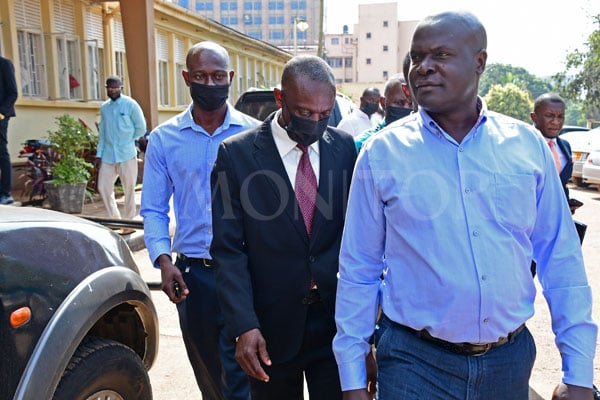Prime
Makerere moves to reduce undergraduate admissions

Makerere Vice Chancellor Prof Barnabas Nawangwe (left) with the chairperson of the Education Review Commission, Col (Rtd) Amanya Mushega, at the university yesterday. PHOTO | MICHAEL KAKUMIRIZI
What you need to know:
- While meeting a team from the Education Review Commission led by the chairperson, Col (Rtd) Amanya Mushega at the university yesterday, Prof Nawangwe said undergraduate admissions would be slashed with effect from next year.
Makerere University Vice Chancellor Prof Barnabas Nawangwe has said they will soon downsize undergraduate admissions as they move to transition into a research-led institution.
While meeting a team from the Education Review Commission led by the chairperson, Col (Rtd) Amanya Mushega at the university yesterday, Prof Nawangwe said undergraduate admissions will be slashed with effect from next year.
“On average, we admit 14,000 students every year, but from next year, the number might go down to 12,000,” he said.
Prof Nawangwe said reducing the number of undergraduate students will allow the university to admit more graduate students.
“Currently, graduate students account for only 15 per cent of the enrollment. We want to increase that to at least 30 per cent. We can do that in two ways; one, by leaving the undergraduate where they are, and increasing the graduate admissions,” he said.
“The other is gradually reducing the number of undergraduates and increasing the number of graduate students sponsored by the government. That might be easier because at the moment, all graduate students are basically self-sponsored and some of them drop out because they can’t afford tuition,” the vice chancellor added. Prof Nawangwe argued that transitioning into a research-led university is to enable the institution to become more relevant to the challenges facing the world.
“Categorising Makerere as a research-led university is extremely important because it is the research that we conduct here that will solve a lot of issues we are facing right now; health, epidemics and food security,” he stated.
Prof Nawangwe said although Makerere University has produced 90 percent of people in this country with PhDs, the government should consider sponsoring more students at that level, in addition to investing in research infrastructure such as laboratories so that it can get maximum benefits from universities.
“The tuition for Master’s and PhD students per year ranges between Shs5m and Shs14m. These are people who are working. Some are not working and it is very expensive for them to pay this tuition,” he said.
He revealed that every year, about 1,000 poor students drop out of university because they can’t afford tuition.
“Why shouldn’t we learn from neighbours? We used to have more than 2,000 Kenyan students, and the government of Kenya realised that they were spending so much foreign currency in Uganda. They decided to establish a loans scheme for their students,” he said.
Other recommendations included redesigning the university curriculum to suit local needs, digitalising teaching and learning, doing the training in soft skills compulsory, and appreciating the role of humanities in dealing with societal problems.
Background
The Education Review Commission was launched in May 2021 to conduct a rapid assessment of the current education system. The outcomes of the findings will be considered by the government when developing a new education white paper to replace the 30-year-old Prof Senteza Kajubi report.




